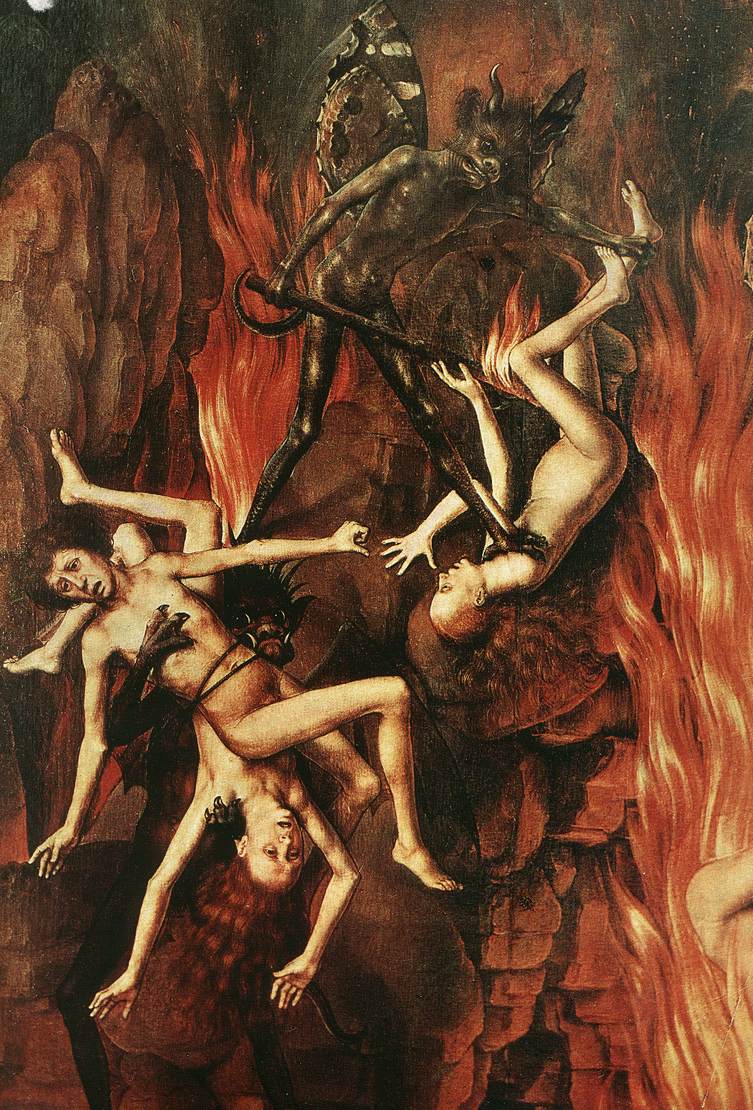|
A number of years ago, a music group called the Squirrel Nut Zippers released a song called "Hell".* The opening line is "In the afterlife, you'll be headed for the serious strife." It's a campy, strange song -- but, then, the Squirrel Nut Zippers are a pretty off-beat group. On the other hand, it's not often that a popular music group tackles such a significant theological topic.
Hell, or some other bleak post-death manner of existence, is found in most major religious traditions. While some biblical scholars might argue that the notion came late to Judaism, it is certainly present there now in some forms, as it is in the belief structures of Judaism's heirs: Christianity and Islam. And, even though pictures of burning lakes of fire aren't as present in Hinduism or Buddhism, the belief in karma and reincarnation can be seen to serve some of the same theo-sociological control impulses, i.e., "Straighten up and fly right, or . . . you'll spend eternity being punished, or you'll come back in your next life as a sea-slug."
So, why hell, now? First, several weeks ago, I heard an interview with film-maker Kevin Miller. He has put together a documentary called "Hellbound",** in which he asks the question, "Can we abandon hell"? And, in asking that question, he ran into amazing amounts of amazing push-back from all sorts of people. He repeats one young woman's story of telling her grandmother that she no longer believed in hell; her grandmother would rather have heard that she no longer believed in God! And, Miller points out, hell has to be a permanent destination to be effective, not just a punishment way station before a more benign eternity. Indeed, one of the reasons early Christian theologian Origen was declared heretical was that he believed that, at the end, even Satan would be redeemed. So, for many, then, if we take away hell, we take away any motivation to be good.
But a more immediate trigger was an article I ran across in the most recent Oregon Quarterly.*** The article told about the research of U of O psychology professor Azim Shariff (and his co-author, Mijke Rhemtulla) on whether or not a society's belief in heaven or hell has anything to do with their crime rate. And, according to their research, the answer is "yes." In short, countries that, overall, believe in hell as a place of eternal punishment, have lower crime rates than those that do not. The flip-side is that countries that, as a whole, believe more strongly in heaven have higher crime rates. The reasoning for those latter folks seems to be something like "I can go ahead and shoplift; God will forgive me in any case."
Now, certainly, the argument seems logical (and is often used, for example, to argue for the death penalty): severe penalties should lower the likelihood of certain crimes being committed. On the other hand, the underlying theology of hell (and a God who endorses its existence) is something that I, personally, find troubling. Like many of my religious compatriots (of differing stripes), I am much more drawn to a compassionate, loving, forgiving God. A God who condemns souls to an eternity in torment doesn't seem like a very good example of a Divine Parent (most parents DO punish their children, but most don't abandon them for some infraction of household rules).
So, what are we to do? Resign ourselves to a situation where a forgiveness/mercy-based theology might lead to higher crime rates? Or become hell-bound hardliners that would have us lead fear-based lives? I would hope that there are other alternatives, but it would seem that even though just about every religion has some sort of "Golden Rule", its mere existence hasn't kept people from acting out of self-interest, regardless of the consequences.
Thoughts?
Blessings,
Chaplain Gary
* A video of the group performing the song can be seen here: http://www.youtube.com/watch?v=9uiYp8xKjLM
** The interview can be heard here (it starts about half-way through):
And a trailer for the documentary can be seen here: http://www.hellboundthemovie.com/
*** Regrettably, I left that issue on an airport seat in Denver earlier this week! The original research, however was published about a year ago in PloS One: http://www.plosone.org/article/info%3Adoi%2F10.1371%2Fjournal.pone.0039048
|
Saturday, June 29, 2013
Crime and Punishment?
Subscribe to:
Post Comments (Atom)


No comments:
Post a Comment